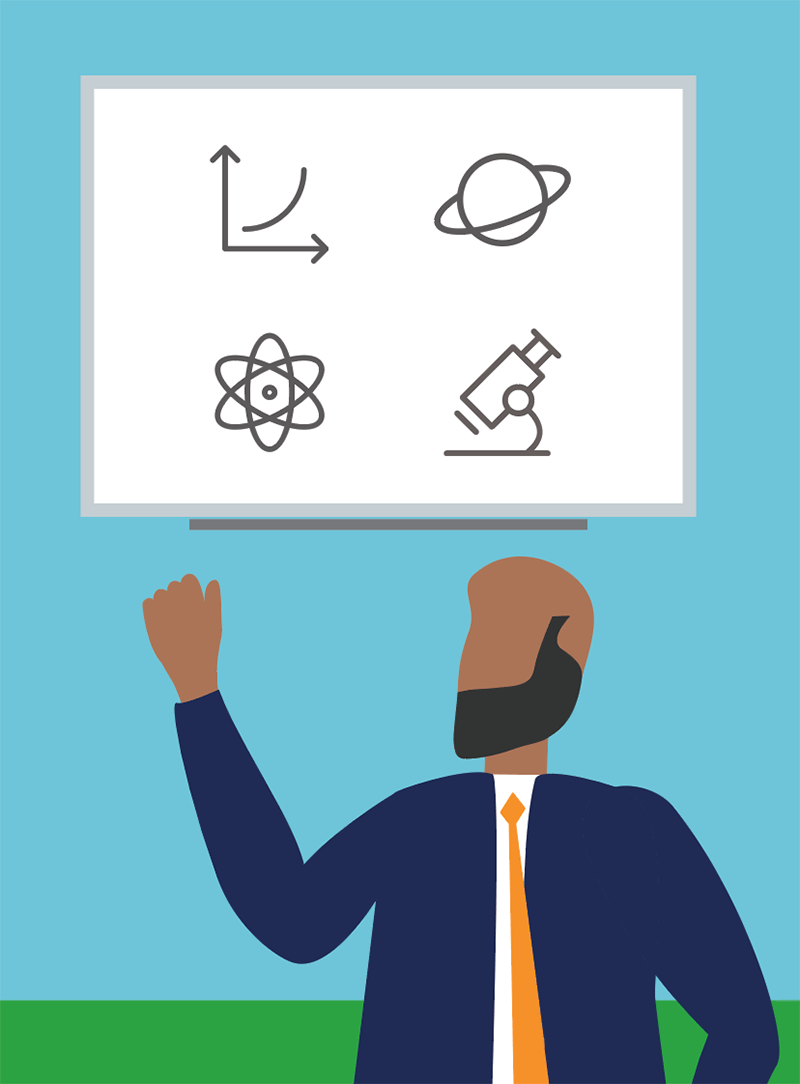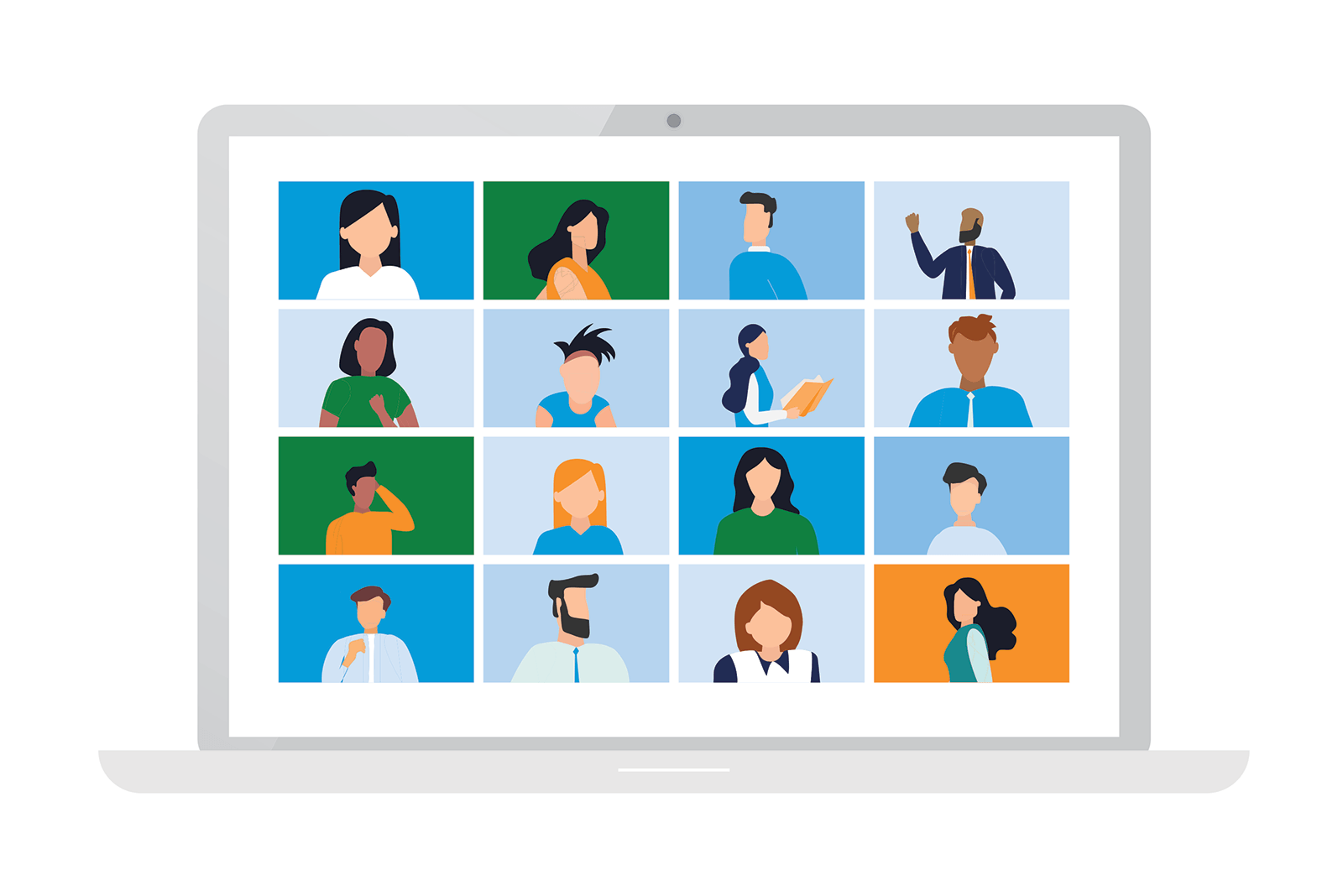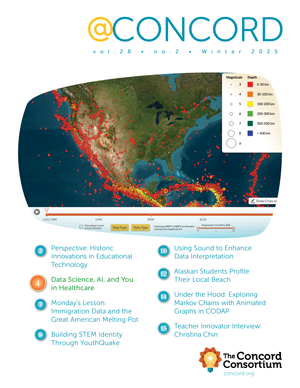Learning Everywhere During a Pandemic
“I believe working with my students and actually having a job to go back to has helped to get my mind off the devastation that is all around me. My students and this class have really helped me through one of the most difficult and traumatic times in my life!”
— Sheree Caminita, following Hurricane Katrina
You may remember Katrina, back in 2005, a Category 5 Atlantic hurricane that devastated Florida and the Gulf Coast. More than 1,800 people died and thousands were displaced from their homes. Schools faced a serious challenge; the hurricane had scattered their students as schools closed or were destroyed. The Louisiana Department of Education and the Louisiana School for Math, Science, and the Arts knew that more courses would have to be taught online. That’s when the Concord Consortium stepped in to offer professional training to 75 additional Louisiana teachers on how to deliver courses in the Louisiana Virtual School. COVID-19 is causing an even more widespread need for online learning and for teachers who know how to provide those courses. And once again, the Concord Consortium has offered online training to teachers in several of our research projects.
Online learning is not new to us. In the 1990s we designed and built the first virtual high school (now VHS Learning). We pioneered new approaches to deepening online learning through the Concord Consortium e-learning model and books on designing and facilitating online courses. We understand how to support teachers to deepen remote learning using tools that allow students and teachers to meet online in real time or asynchronously. Remote teacher professional development, when designed properly, can provide quality learning.
“Inquiry can be done anywhere, but inquiry in a remote setting is more challenging,” explained Concord Consortium Teacher Ambassador and Falmouth, Maine, physics teacher Andrew Njaa, who has been collaborating with us since those early days. “What makes it easier is having a platform and online space to manage and carry out inquiry, plus the expertise to help make that inquiry clear and relevant to students. That’s where the Concord Consortium shines.”
In June we began offering professional development workshops online for several of our National Science Foundation-funded projects, from inquiry-based learning and data exploration to mathematical modeling, watersheds, geohazards, and more. Building a successful remote learning workshop has three primary elements: 1) building caring, supportive learning communities at a distance, 2) facilitating inquiry learning over videoconference, and 3) deepening online discussion by design.
Building caring, supportive learning communities at a distance
Building a successful community online is about building trust and a sense of safety for the participants. Teachers know how to do this naturally in myriad ways in brick and mortar settings, but that sense of safety and trust can also be nurtured at a distance through simple, specific strategies:
- Reach out with informative emails early and often, to the whole group and individually to each participant to build a sense of caring, safety, and connection.
- Use a warm tone in written communications to mitigate the tonelessness of plain factual delivery.
- Disseminate a simple checklist of to-do’s up front so participants can feel confident they are on track.
- Offer an optional virtual meeting to practice new communication skills and features, such as using chat, raising your hand, using reactions, etc.
- Before each session, open the videoconference room a half hour before the official start time. Invite participants to stop in early to chat informally.
- Establish group norms, such as starting on time, muting mics, and changing screen backgrounds or using other features to attend to privacy concerns.
- Begin each session with any clarifications or responses to feedback, setting a tone of mutual respect and collaboration.
- Establish regular videoconference “office hours” when participants can just drop in for a quick question.
- If possible, plan for flexible breakout rooms (and pre-assign staff roles) to provide extra support “on the fly” when just one or two participants have an urgent question, or if someone joins late and needs to get caught up.
Our teachers appreciated the deliberateness that went into building community. Judy Pavao, a biology teacher from Hudson, Massachusetts, liked all the pre-planning—“Thank you all for the work you did in making this workshop seamless”—and Ann Pottebaum from Carroll, Iowa, was enthusiastic about the GeoHazard workshop: “I loved the breakout activities, very well planned and always kept our team engaged and active! We covered a lot in a small amount of time!”
Adhering to these specific strategies builds trust and confidence in the group. But can you replace dynamic inquiry workshops in hands-on physics, biology, and chemistry, which would have met in university science labs, with remote learning? And how do you replace direct experience supported by discussions of pedagogy, Next Generation Science Standards teaching approaches, and our curricular design principles? Of course, you can’t entirely replace the face-to-face experience, but there are multiple ways to make remote learning meaningful and worthwhile.
According to Njaa, the physics teacher from Maine, who also joined us for a July 2019 InquirySpace workshop, “The pivot from the face-to-face workshop at Endicott College last summer to an online workshop was surprisingly painless for me.” But he recognized the amount of planning that was necessary in order to make every hour of online time useful. “You created small, safe spaces to experiment and try out new materials, and to talk and share work in a virtual space. It was truly productive time, and refreshing after spending so many hours already since March in front of my computer.”

Facilitating inquiry learning over videoconference
Many of our workshops asked teachers to develop their own activity or project in a collaborative context where the learning also came from the exchange of ideas. For example, the InquirySpace project supported teachers in designing their own inquiry-based experiments that use data analysis with CODAP (Common Online Data Analysis Platform), activities students can do at home. A combination of independent work and live videoconferencing introduced teachers to our inquiry framework and design principles for developing inquiry-based activities. Working in small groups to build CODAP skills for biology, chemistry, and physics classes, teachers then designed and shared an activity they could assign at a distance for hybrid or remote classes. Pam McDonald, a chemistry teacher from Hudson, Massachusetts, enjoyed “seeing the ideas and lessons developed by others, which gives me more ideas for other lessons.” Shawn Guerrette, a physics teacher from Cape Elizabeth, Maine, also appreciated “getting to share ideas for physics exploration activities for distance learning.” Indeed, for Guerrette, this was “the high point” of the online workshop.
A few specific strategies help to ensure videoconference-based professional development is well received:
- Mix it up and encourage interaction. Use jigsaw grouping and design other small-group activities for cross-pollination of ideas and to increase learner input and voice.
- Use a shared virtual document to exchange resources with a “parking lot” section to temporarily table interesting ideas.
- Collect daily feedback using “exit ticket” surveys at the end of each day. Be open to feedback, responsive, and when possible, adjust plans based on suggestions.
- Structure opportunities for peer review that are designed to assure everyone gets timely feedback. Provide a rubric so reviews are supportive and less like critiques, valuing the positives and offering suggestions for how challenges might be addressed.
- Plan videoconference sessions for three hours or less, incorporating breakouts, active participation, varied activities, and regular breaks.
- Use polling where possible and hand-raising tools to quickly assess participant reaction.
- Purposefully build in networking opportunities.
Deepening online discussion by design
Many of our projects added an asynchronous professional learning community (PLC) to the workshop in order to model online activity designs for deepening online learning. For example, after teachers read an article, we organized conversations into discipline groups and provided specific instructions about how to contribute: “Please respond to at least two of your discipline group colleagues’ initial postings by extending a thought, adding an example, sharing an experience, offering a caveat or consideration, asking a question for clarification, or otherwise interacting. Avoid evaluating your colleagues’ contributions.”Other strategies make an online PLC useful for learning beyond just sharing resources and answering specific questions:
- Allow participants to find and practice their online voice in low-stakes conversations before talking “real science.”
- Create separate “Teachers’ Lounge” and “Help” discussion threads to keep content-based discussions focused. If appropriate, consider including discipline-based discussions for extended networking and idea exchange in specific subject areas.
- Optimize participant flexibility by specifying the asynchronous reading and discussion assignments up front so that tasks can be completed based on personal schedules.
The school year has started and teachers are feeling the strain of having to be flexible about how class is delivered each day. Only a few are back in school with their students daily. Instead, multiple hybrid models are emerging across the country and positive COVID tests have closed down schools with little warning. Pivoting our plans to offer remote summer workshops provided us with a small glimpse of the challenges teachers are experiencing this fall, and we commend their incredible efforts.
“I am grateful to be part of a collaborative team of experienced teachers who have diverse experiences and skill sets across various STEM disciplines,” noted Emerlyn Gatchalian, a physics, chemistry, and biology teacher and Concord Consortium Teacher Ambassador from Hercules, California. “Together we hone our teaching skills in a way that sustains learning and builds craftsmanship and resilience to better prepare us in this new way of teaching and learning.”
And as Thomas Cooper, a teacher in our CodeR4MATH project, suggests, “There are all these issues about how working online can highlight issues of equity, but technology can also give us a common place to start a journey towards understanding each other.”
For this reason and more, we hope that some of the strategies teachers have adopted from their experience with remote professional learning will prove useful beyond the pandemic and find a more permanent place in their pedagogical toolkits.
Sarah Haavind (shaavind@concord.org) is a senior research project manager.
This material is based upon work supported by the William K. Bowes, Jr. Foundation. Any opinions, findings, and conclusions or recommendations expressed in this material are those of the author(s) and do not necessarily reflect the views of the William K. Bowes, Jr. Foundation.

